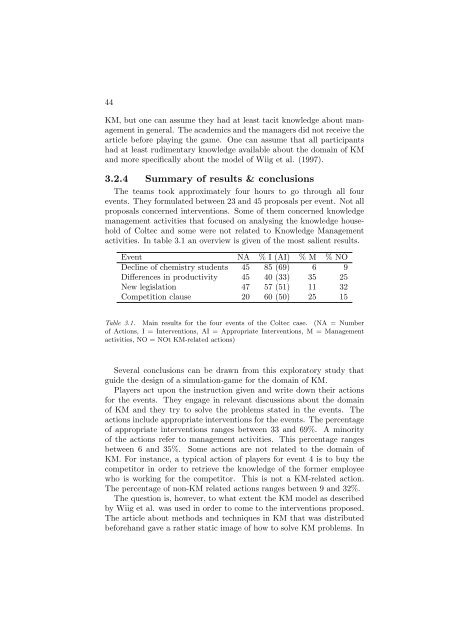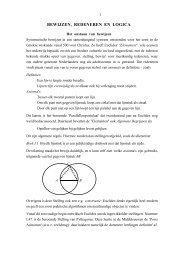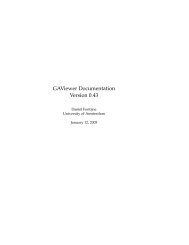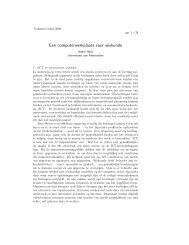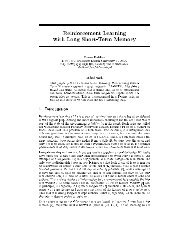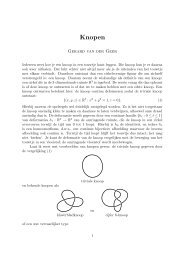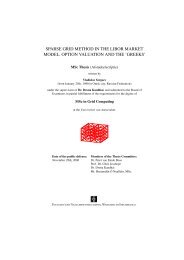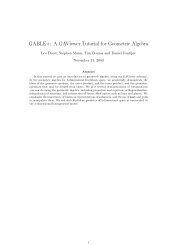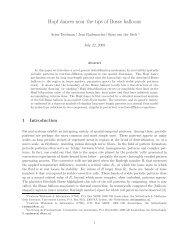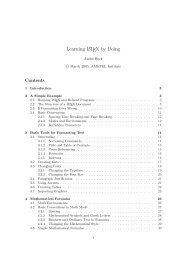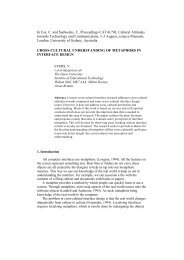The role of metacognitive skills in learning to solve problems
The role of metacognitive skills in learning to solve problems
The role of metacognitive skills in learning to solve problems
You also want an ePaper? Increase the reach of your titles
YUMPU automatically turns print PDFs into web optimized ePapers that Google loves.
44<br />
KM, but one can assume they had at least tacit knowledge about management<br />
<strong>in</strong> general. <strong>The</strong> academics and the managers did not receive the<br />
article before play<strong>in</strong>g the game. One can assume that all participants<br />
had at least rudimentary knowledge available about the doma<strong>in</strong> <strong>of</strong> KM<br />
and more specifically about the model <strong>of</strong> Wiig et al. (1997).<br />
3.2.4 Summary <strong>of</strong> results & conclusions<br />
<strong>The</strong> teams <strong>to</strong>ok approximately four hours <strong>to</strong> go through all four<br />
events. <strong>The</strong>y formulated between 23 and 45 proposals per event. Not all<br />
proposals concerned <strong>in</strong>terventions. Some <strong>of</strong> them concerned knowledge<br />
management activities that focused on analys<strong>in</strong>g the knowledge household<br />
<strong>of</strong> Coltec and some were not related <strong>to</strong> Knowledge Management<br />
activities. In table 3.1 an overview is given <strong>of</strong> the most salient results.<br />
Event NA % I (AI) % M % NO<br />
Decl<strong>in</strong>e <strong>of</strong> chemistry students 45 85 (69) 6 9<br />
Differences <strong>in</strong> productivity 45 40 (33) 35 25<br />
New legislation 47 57 (51) 11 32<br />
Competition clause 20 60 (50) 25 15<br />
Table 3.1. Ma<strong>in</strong> results for the four events <strong>of</strong> the Coltec case. (NA = Number<br />
<strong>of</strong> Actions, I = Interventions, AI = Appropriate Interventions, M = Management<br />
activities, NO = NOt KM-related actions)<br />
Several conclusions can be drawn from this explora<strong>to</strong>ry study that<br />
guide the design <strong>of</strong> a simulation-game for the doma<strong>in</strong> <strong>of</strong> KM.<br />
Players act upon the <strong>in</strong>struction given and write down their actions<br />
for the events. <strong>The</strong>y engage <strong>in</strong> relevant discussions about the doma<strong>in</strong><br />
<strong>of</strong> KM and they try <strong>to</strong> <strong>solve</strong> the <strong>problems</strong> stated <strong>in</strong> the events. <strong>The</strong><br />
actions <strong>in</strong>clude appropriate <strong>in</strong>terventions for the events. <strong>The</strong> percentage<br />
<strong>of</strong> appropriate <strong>in</strong>terventions ranges between 33 and 69%. A m<strong>in</strong>ority<br />
<strong>of</strong> the actions refer <strong>to</strong> management activities. This percentage ranges<br />
between 6 and 35%. Some actions are not related <strong>to</strong> the doma<strong>in</strong> <strong>of</strong><br />
KM. For <strong>in</strong>stance, a typical action <strong>of</strong> players for event 4 is <strong>to</strong> buy the<br />
competi<strong>to</strong>r <strong>in</strong> order <strong>to</strong> retrieve the knowledge <strong>of</strong> the former employee<br />
who is work<strong>in</strong>g for the competi<strong>to</strong>r. This is not a KM-related action.<br />
<strong>The</strong> percentage <strong>of</strong> non-KM related actions ranges between 9 and 32%.<br />
<strong>The</strong> question is, however, <strong>to</strong> what extent the KM model as described<br />
by Wiig et al. was used <strong>in</strong> order <strong>to</strong> come <strong>to</strong> the <strong>in</strong>terventions proposed.<br />
<strong>The</strong> article about methods and techniques <strong>in</strong> KM that was distributed<br />
beforehand gave a rather static image <strong>of</strong> how <strong>to</strong> <strong>solve</strong> KM <strong>problems</strong>. In


